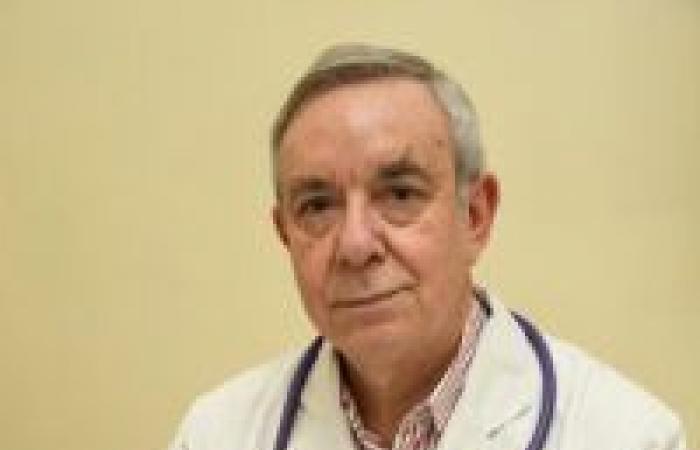
Likewise, he insisted on the importance of getting vaccinated against Influenza and Covid, along with taking physical measures such as frequent hand washing, physical distancing and wearing a mask in patients who have respiratory symptoms.
He also called for the monoclonal antibody Nirsevimab to be applied to all infants born after October 1, 2023, which protects around six months, which is the most serious period, in which they are exposed to infections due to respiratory syncytial virus.
“Some people have died with Streptococcus pyogenes which is a bacteria that has the ability to superinfect an Influenza case. Influenza decreases defenses and especially at a local level what it does is destroy the ciliated epithelium, which is a sweeping system that we have, affecting the integrity of the respiratory epithelium. As the integrity of the respiratory epithelium has been altered, bacteria that are normally not capable of destroying these barriers manage to enter. So within those bacteria is the Streptococcus pyogenes which has been the cause of death of some people, even young people.”
This is what Dr. Mario Calvo Gil, Professor Emeritus of the Faculty of Medicine of the Austral University of Chile, corresponding member of the Chilean Academy of Medicine and former President of the Chilean Society of Respiratory Diseases, proposed that “if an adult “or child has had a fever for 48 or 72 hours, do not assume that it is just influenza but it is better to consult in case there is an added bacterial infection.”
It should be remembered that Influenza is a group of viruses that produces more intense manifestations, as, for example, what is typical in influenza A is that general symptoms predominate, that is, the person suddenly starts high fever, great weakness, headache, fever that can last two or three days and later respiratory symptoms appear. This disease is different from the common cold, which is frequently caused by Rhinovirus, among others, in which respiratory symptoms predominate, such as runny nose, cough, sore throat, fever in some cases, but the person feels relatively well.
“Obesity is becoming an important comorbidity”
Dr. Calvo explained that there have been serious problems in age groups that were not expected because generally with Influenza it is typical that the greatest complications are in older people, especially over 65 years of age or people who have comorbidities, such as chronic lung disease, diabetes and obesity. “Obesity is being an important comorbidity not only in patients with flu. “The coronavirus showed us that being obese was a risk factor for having very serious respiratory diseases.”
At this time, faced with the risk generated by influenza A, “what we have to do is get the vaccine and what has been most proven to prevent viral infection continues to be physical measures such as frequent hand washing, physical distancing and use of a mask. in the patient who has respiratory symptoms.”
In that sense, it is essential that the patient be responsible towards others and put on a mask as soon as they have respiratory symptoms. “In the coronavirus we all had to wear a mask because the initial cases were very serious and there was a lot of mortality. Unfortunately, some people have died with influenza, but fortunately the vast majority overcome the disease. So at this time there is no indication that everyone wears a mask, but many healthcare people, including myself, do use them when we have contact with patients. I see here that patients who have respiratory symptoms arrive with a mask and that is a responsibility towards others that is worth highlighting.”
In his opinion, it is very important to hopefully adopt some cultures from other countries, especially Japan, where it is commonly seen that people wear masks when they have respiratory symptoms. In that case it is an individual responsibility with the group.
Strengthen campaigns and get vaccinated against influenza and coronavirus
The specialist stated that “unfortunately this year we, from a medical point of view, are not satisfied with the campaign because it was done very late. In fact, until last week I knew that there were some schools that had not yet been vaccinated. We need the vaccination campaigns to be massive to generate the herd effect, having over 80% vaccinated. We are used to it and I believe that there is nothing to innovate here, but what we have to do is copy. The more vaccination sites we have, the better. For example, in Valdivia the classic thing was to get vaccinated at the bus exit and this year I did not see it. Many countries have called this dirty vaccination. That is, the person passing by in a public place is offered vaccination and is convinced. Because we have no other way to defeat these diseases.” He even remembered that a long time ago a vaccination center was set up at the post office.
Regarding the question of whether it is necessary to be vaccinated against Influenza and Covid at the same time, the Professor Emeritus was emphatic in indicating that both are necessary. “We still do not have a totipotent vaccine. Each vaccine is directed against a specific microorganism. Therefore, it is essential to get vaccinated against influenza and coronavirus. We must not let our guard down because the coronavirus is there, although it is low. But we don’t know if when influenza begins its normal decline, as the winter passes, maybe the coronavirus will rebound.”
Regarding what is happening in Valdivia, he mentioned that “at this time, fortunately, we have had more outpatient medicine consultations than hospitalized patients – as of Tuesday, June 11, when the interview was conducted. I spoke with Dr. Karin Grob, who is the Head of the Pediatric Service, which is prepared to receive a large number of patients, but fortunately so far the pressure on hospitalization has been very light. There is a lot of pressure in the outpatient part, but not in hospitalization with seriously ill patients.”
Nirsevimab monoclonal antibody against respiratory syncytial virus in infants
The corresponding member of the Chilean Academy of Medicine urged that all infants born since October 1, 2023 be given the monoclonal antibody Nirsevimab, which protects around six months, which is the most serious period in which they can become infected by respiratory syncytial virus. This medication is found throughout Chile and it is essential to apply it because “last year the great increase in cases and the great mortality was due to respiratory syncytial virus in infants. Until now there was no infant hospitalized for respiratory syncytial virus in Valdivia. The credit has gone to the Europeans because this monoclonal antibody was approved in Europe ten months before in North America. In vaccines, the vaccinated person has to develop their own defenses, with this monoclonal antibody they immediately receive the defenses that will protect them against the respiratory syncytial virus.” This allows that when a single dose is applied, defenses are delivered to the body for more or less 5 to 6 months.
Lessons from Europe: need to prevent respiratory infections
The former President of the Chilean Society of Respiratory Diseases participated in the European Congress of Asthma, Allergy and Clinical Immunology, a meeting that allowed him to access valuable information. “The most important lesson is the need to prevent infections because they are not trivial. This is because not only can they cause mortality, but they can also cause morbidity. Recurrent respiratory infections, both in children and adults, can impact lung function. Lung function normally declines after age 65 and begins to decline. One of the things that was greatly insisted on at this congress is that respiratory infections in children, as well as young adults, if they are repeated, will subsequently impact the adult.”
He also learned about the success that the monoclonal antibody Nirsevimab has had against respiratory syncytial virus. There is a very important Spanish experience, since they were the first to begin applying it on a massive scale and managed to reduce severe infections in infants by 80% to 90%. “Therefore, preventive measures are always going to be better than curative measures,” he said.
Finally, he called on the community: “There are people who are looking for some magic medicine to not get sick, which does not exist. “Vaccines and physical measures such as frequent handwashing, physical isolation and masks remain most important.”





